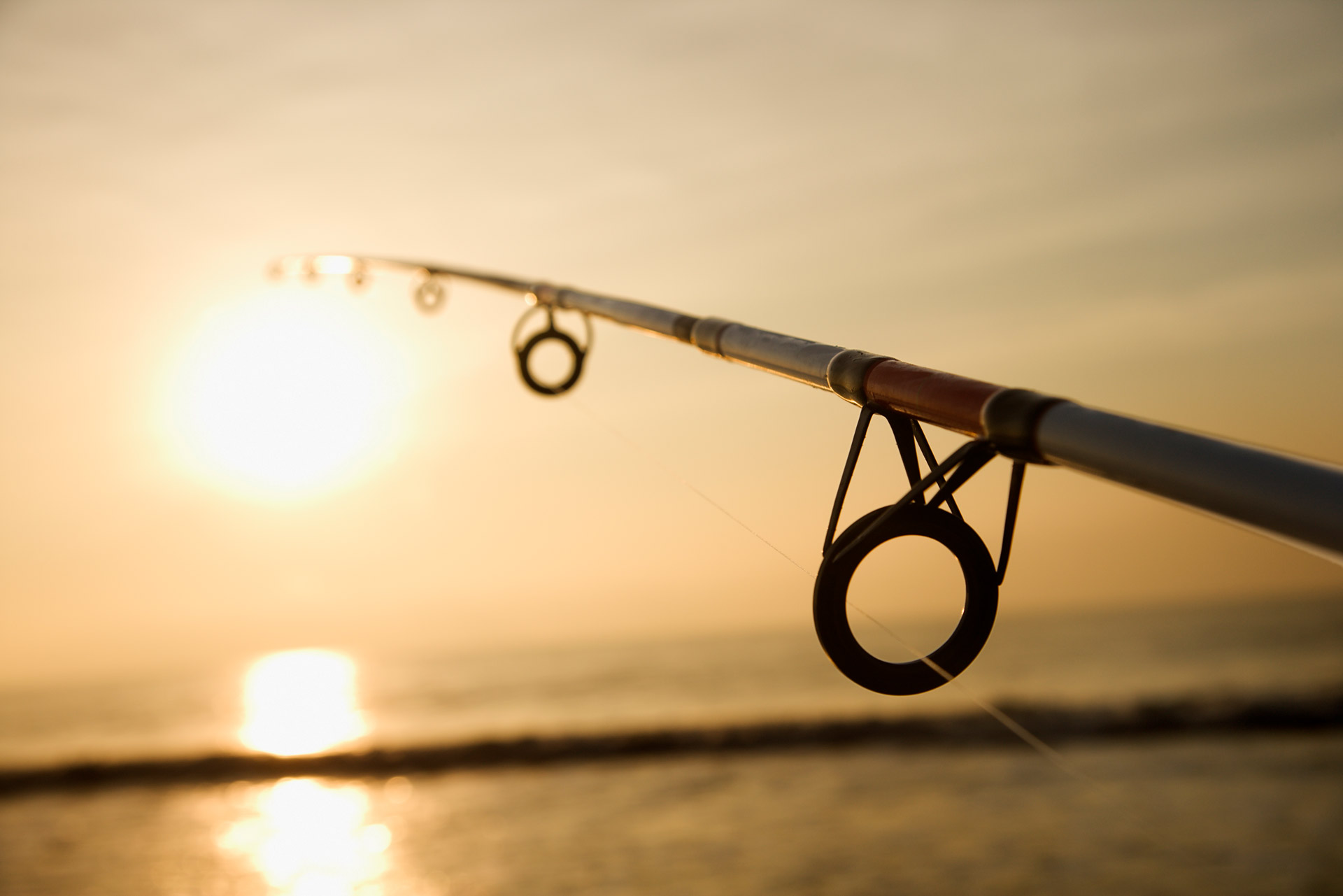Winter Bass Fishing Tips: Catch More this Winter
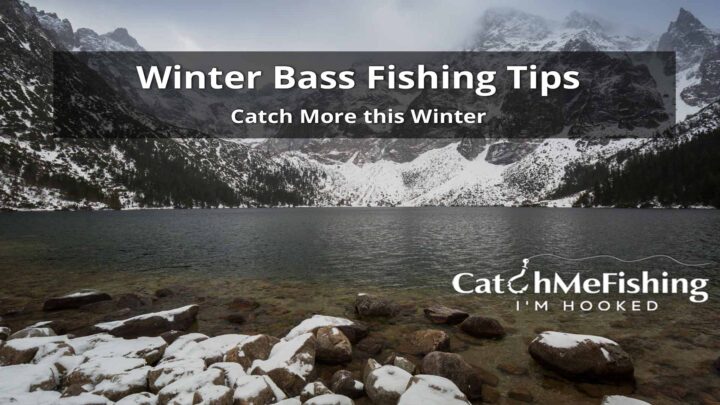
As winter's icy grip tightens on the land, you might wonder whether it is worth fishing in the freezing cold for bass. The answer is yes!
Winter bass fishing can be challenging. The water is cold, the days are short, and the fish are harder to find. But it doesn't have to be that way!
When fishing for winter smallmouth or largemouth bass, it becomes a challenge in the cold, you must rely on different techniques and baits that will attract them.
Using the correct techniques and equipment, you can have just as much success and fun in the winter as you would in the warmer months.
In this post, I'll go over some of the best types of baits and techniques I use to catch bass in the winter months and how to keep safe while doing so!
Winter Bass Fishing Tips
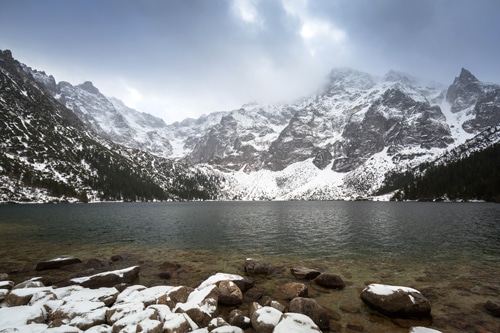
In the winter, bass fishing is challenging, so you need to rely on tricks and bait to attract them.
Using the correct equipment and techniques can have just as much success in winter as in warmer months.
Choose the Best Bait
Since the water is so cold, the bass don't want to exert additional energy to catch hard-to-catch baits.
Thus, in cold water, you should not present a challenge that is too difficult to overcome for the bass.
A winter fishing tactic requires a certain amount of finesse, but it also requires some planning. For example, fast-moving and loud lures won't work in cooler weather when bass are less active than in the summertime.
For lure color, I go as natural as possible and try to match the color of the baitfish. Bright neon colors will look intimidating and a challenge the bass will not want to take.
More slow-moving lures like spoons, blades, and jigs are preferred for winter bass fishing.
Metal Baits
Metal baits like spoons and blades make an excellent choice for bass fishing in the winter and are my personal favorite.
Metal baits mimic dying baitfish, making them an easy hunt for the bass in the winter when their metabolism is running low.
They also hold up well in the frigid cold winter waters. They are the most resilient of all baits, so you don't have to worry about them breaking or causing you problems.
Soft Plastics
Rigging soft plastics in the winter is a great bait and technique I use to get deep in the water.
My favorite is a Drop-shot rig, but you can also use a split-shot rig with one of your favorite fishing rigs to get you down to the deeper warm water.
Drop-shot rigs are great for fishing slow, which you will want to do in the winter when the bass are more passive.
Experiment with your soft plastic lure size and colors to find the one best for you.
I often find the smaller baits with neutral colors give me the most success in the winter. I constantly change up my leader length depending on how far off the bottom the bass are.
Football Head Jigs
When dragged along the bottom, I have great success with football head jigs in the winter.
This type of lure replicates the look of a crawfish, so picking a color that looks legit will work best. For example, choosing brown or green will give you the best chance at convincing the bass that this is a real crawfish.
Because they can get so close to the bottom of the body of water, football head jigs are excellent for winter bass fishing.
Drag them along the bottom slowly to entice the bass. Slow is your friend here, and you want to retrieve this lure as slowly as possible for the best results.
Downsize
Presenting a smaller lure as the weather gets colder is an excellent choice for increasing your chances of a catch.
The smaller baits you use, the less energy it usually takes for the bass to eat, and thus the more opportunities you will get.
A smaller bait will look like an excellent opportunity for the bass to grab an easy meal.
You can also use a lighter weight in your drop shot rig when fishing with smaller baits to ensure you are fishing at a perfect depth.
You don't want to use anything that will intimidate the bass. Smaller typically means better when it comes to winter fishing.
Slow Your Bait's Movement
As well as downsizing your lure, you will also want to slow down your presentation.
Meaning as the temperature of the water drops, you should also slow your presentation down.
To catch largemouth bass in the winter, you must think like one.
They're not eating much, so chasing a topwater spinnerbait halfway across the lake with a fast-moving bait won't work. Bass metabolisms are slow, don't actively feed, and the water is cold.
If you drop something right in front of their faces, make them think the bait is a dead baitfish, and then you move it slowly, you'll fool them into believing they have an easy meal.
It will be pretty easy to retrieve them after that, as they won't fight much due to being lethargic in the winter.
Fish Near the Shore
Shorelines of lakes and rivers offer the most oxygen-rich water, where the baitfish will naturally be attracted. It also offers the baitfish some warmth from the sun during the day.
These two elements attract the bass as they hunt and follow the baitfish.
Targeting bass near these areas is a great way to ensure you have success.
Unlike boat fishing, fishing from the shore offers warmth and protection from the wind and the environment. In addition, the surrounding areas and trees on the shore will give you cover from the cold elements.
I love bass fishing from the shore in the winter. I usually cast parallel to the shore and have great success.
Let Your Electronics Work for You
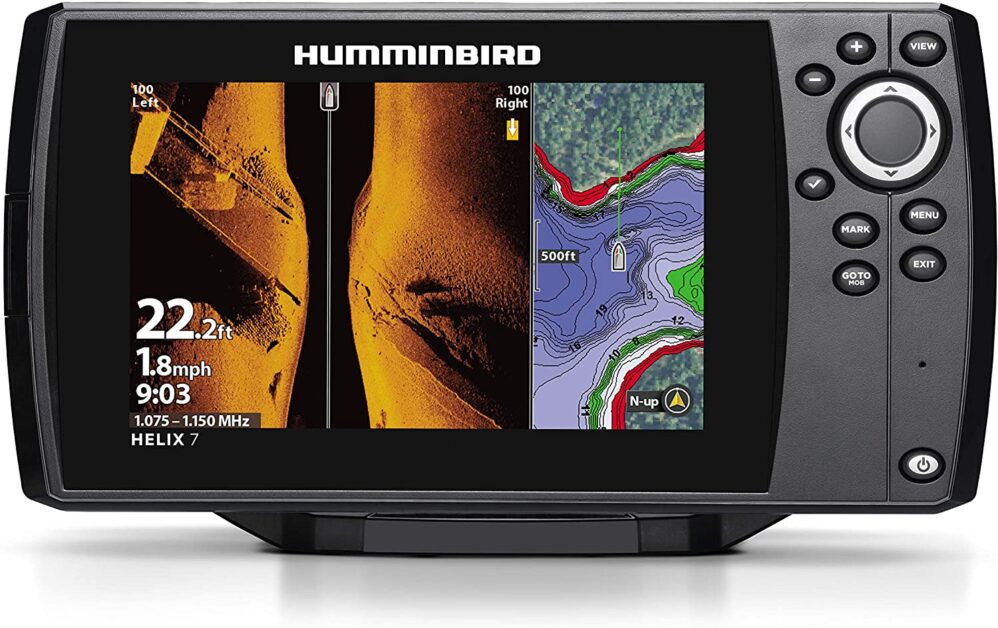
In the winter, you will need to carefully watch your electronics and strategically plan where you will fish before doing so.
Using a good fish finder will help you successfully choose the best possible places to fish and make your life a lot easier.
Fishfinders will let you know what temperatures and depth of the water is below you, plus where all the bass are. They also offer you side and down imaging. Using this information gives you much more chances of catching fish.
Stick to Deep Pockets in Lakes
In winter, bass don't want to spend much energy swimming all over the lake looking for a meal.
They want the warmth that deep pockets in lakes offer them.
Using a football head jig will help you fish in these deep pockets.
Electronics show where these deep pockets are located, and while it's not needed, a fish finder will undoubtedly make your life a lot easier.
Be Patient
Bass are finicky in the winter, just like they are after a cold front. This requires us anglers to take a more patient approach.
The bass are moving much more slowly throughout the water, their metabolism is low, and they are not going to grab anything your throw in front of them.
This time requires us to have much more patience and try new things.
Don't rush, stay calm, and you will eventually catch the bass you are after.
Retrieve your bait much more slowly than you typically do in the warmer months.
I have learned over the years while winter bass fishing that patience is a virtue, and if you take your time, you will succeed.
Water depths
It's important to remember that depth is relative, and the depth you fish depends on the lake. For example, some lakes have fewer than ten feet depth, while some are between 40-50 feet.
Even in the winter, when bass are hungry, they will follow their food source into the shallows.
Bass will follow baitfish even if they are not feeding as much as in the fall and summer.
A general rule is that the warmer the water, the shallower the baitfish and bass.
Best Fishing Locations in the Winter
During the colder months, bass moves deeper to escape the cold water of the shallows.
Even though bass tend to be deeper in these months of the year, they will still search for food at different depths. They will swim fast enough between shallow water and deep water to feed in the ideal situation.
Winter bass are often found in deeper water near a known bass spawning site. Depending on your knowledge of the water, you'll find the most success fishing in the deeper spawning areas.
Additionally, bass follow baitfish around the shoreline. Baitfish will migrate to the water that contains the most oxygen. The conditions are perfect for the falloff from the banks and the defrosting of ice and snow.
Best Time for Bass Winter Fishing
As we know, morning and evening are the best times to fish during the summer. However, when fishing in the winter, it's different. It's best to go when it's warmest, midday.
In the winter, you'll want to fish more in the middle of the day because the water needs time to warm up. This leads to fish biting more in warmer weather.
Moreover, once the sun starts shining on the water, you will be more likely to catch bass.
Best lures for winter bass fishing
I always take a wide variety of lures with me when I go winter fishing.
Bass are lethargic and won't bite everything you throw at them. Therefore, fast-moving topwater lures and anything else that would cause a finicky bass to turn away should be avoided.
Bass fishing in the winter requires a different approach, and you will likely have to try a few different lures before you find one that's working.
With fast-changing water temperatures and weather conditions, it's great to have a good selection of winter bass lures and colors to do the trick. Although, I have most of my success using natural lure colors in the winter.
Bass Fishing Winter Water Temperatures
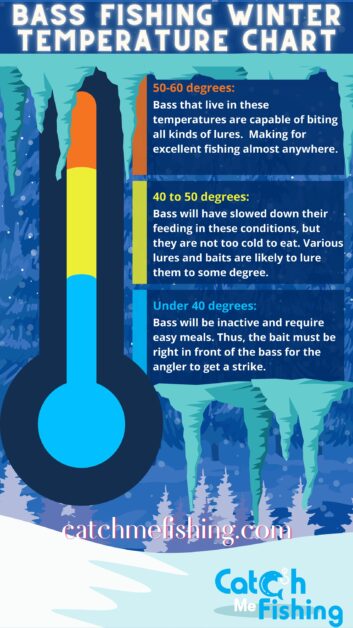
Depending on the temperature of the water, bass have different feeding habits. The change in water temperature tells the bass when to move to deeper waters or spawn.
Below, I have created a series of temperatures determining when bass change their eating habits. Although this can change for different regions, I find its a good rule to stick to:
Under 40 Degrees: Fishing for bass at these temperatures can be challenging, but you can do it. Below 40 degrees, bass will be inactive and require easy meals. Thus, the bait must be right in front of the bass for the angler to get a strike.
40 to 50 Degrees: These temperatures make winter fishing ideal. Bass will have slowed down their feeding in these conditions, but they are not too cold to eat. Various lures and baits are likely to lure them to some degree.
50 to 60 Degrees: Bass that live in these temperatures can bite all kinds of lures. For much of the country, these temperatures are not typical of winter, but in southern waters, they are possibly the coldest time of the year. During these temperatures, the bass are transitioning from one season to another, from autumn into winter or winter into spring. Making for excellent fishing almost anywhere.
Prepare and Stay Safe with the Right Gear
A winter fishing venture can be dangerous due to extreme cold and frigid waters.
Set out a plan of the time and day and the areas in which you will be fishing. Check the weather a day before and keep updated to ensure you won't get hit by harsh weather while fishing.
Try to find someone to go fishing with you. Taking someone with you reduces the safety risks tremendously. If that's not possible, let your family or friends know where you will be going and when you will be back.
If you go alone, carry a mobile phone with you and organize a routine checkup call with one of your friends or family members to let them know you are safe and everything is going ok.
Clothing
Dressing in layers will not only make your winter fishing trip more enjoyable it is also required for your safety.
While freezing feet and hands you can't feel can ruin a fun time, it can also be very dangerous. That's why wrapping up in layers and choosing the right clothes to keep you warm is vital if you want to fish for bass in the cold winter temperatures.
Dress in layers. Wear thermal socks, Fleece pants, and a shirt under your clothes. These will provide the thermal protection your body will need.
On top of your thermal base layer, you want an excellent fleece shirt and jacket.
The last layer is your waterproof layer. This should include robust, well-insulated waterproof pants and a good zippable rainproof jacket. Finding ones with plenty of pockets will give you quick access to the storage tools you will need quickly.
I use a pair of good thermal hand warmers with open-finger slits. Great for keeping your hands warm while allowing you to still function and some hot hands hand warmers to heat the hands when needed.
A good hat to keep your head warm will make a massive difference in keeping you warm.
Some quality, well-insulated boots Like the Muck work boots will ensure your feet will stay warm (Trust me, cold feet will ruin your trip)
Equipment
Besides these items, you might also require the following equipment to stay safe and enjoy your winter fishing trip:
- Mobile phone to communicate with friends and family in case of an emergency.
- GPS and/or a compass.
- Two-way radio.
- Charges for your electronic devices.
- First aid kit and an emergency blanket.
- Emergency food supplies such as snacks and water.
- A map to ensure you are fishing in areas you want to be and don't get lost.
- Headlamp or flashlight with fully charged batteries.
- You may need tools such as knives, pliers, line clippers, and multi-tools.
- Spare batteries for your electronic devices.
- Ensure your car is full of gas before your trip.
You may not need some equipment, but having them just in case you do could be life-saving.
Final Thoughts
The winter can be a challenging time to fish. You may not get as many bites, and the weather often dictates where you end up fishing, but that doesn't mean it's impossible.
Winter bass fishing is more challenging than in other seasons because of cold weather, but there are some things you can do to make your trip successful and enjoyable for everyone involved.
While winter fishing can be very rewarding, you must take extra precautions and ensure you are safe.
If you like fishing in the winter, maybe kayak winter fishing will tickle your fancy.
Remember to fish slowly and be patient. Present the bass with a meal they can't say no to, and you will have a lot of success.



